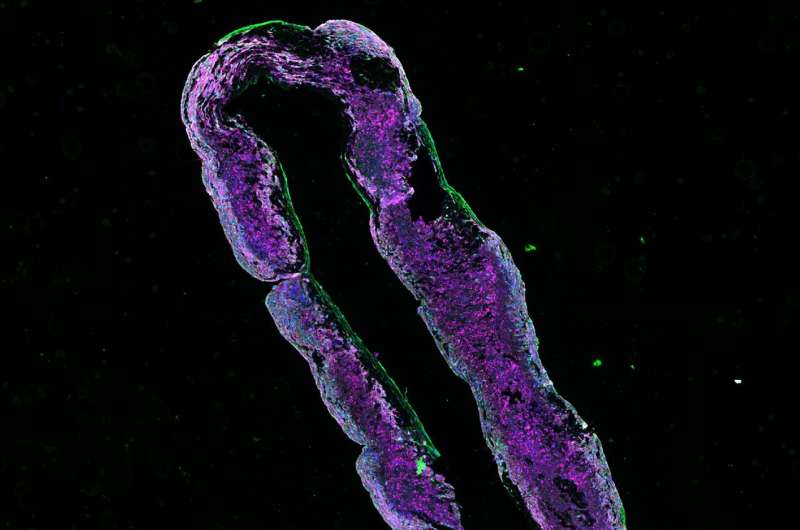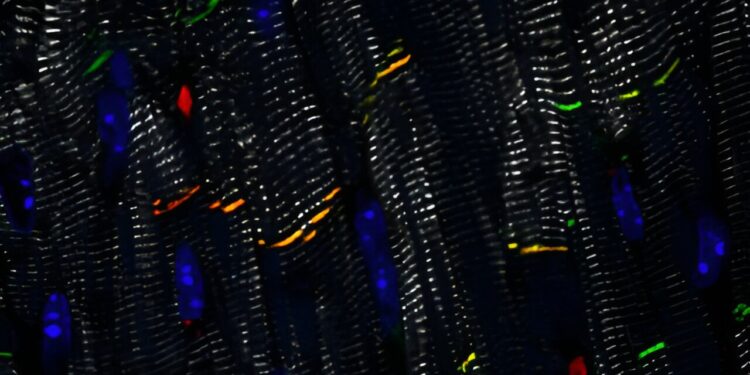Microscopic image showing cardiac muscle cells (gray) in a mouse heart. The protein plakophilin-2 (green) is present in desmosomes connecting adjacent cardiac muscle cells. After the healthy PKP2 gene is introduced, extra plakophilin-2 (red) is present in the cells (visible in yellow where green and red overlap). This localizes to desmosomes, leading to their structural recovery. Credit: Eirini Kyriakopoulou. Hubrecht Institute.
Researchers at the Hubrecht Institute have laid the foundation for the development of gene therapy for genetic arrhythmogenic cardiomyopathy (MAC). Their approach, based on replacement of the PKP2 gene, led to significant structural and functional improvements in laboratory models of the disease.
The study by Eva van Rooij’s group was published on December 7, 2023 in Nature Cardiovascular Research. Multiple clinical trials will begin in 2024 in the United States to explore the clinical potential of this approach in MCA patients with PKP2 mutations.
CAD is a genetic heart disease that affects 1 in 2,000 to 1 in 5,000 people worldwide. It is characterized by arrhythmias and can lead to sudden cardiac arrest. Current treatment for the condition typically consists of antiarrhythmic medications and implantable cardioverter defibrillators (ICDs), which focus only on treating symptoms rather than getting to the root of the problem.
The disease is progressive, with an increasing portion of the heart muscle being replaced by fatty tissue and heart function worsening over time. This can eventually lead to heart failure. In severe cases, heart transplantation may be performed as a last resort, but this is complicated by long waiting lists due to the limited availability of suitable donor hearts. There is therefore an urgent need for effective treatments targeting the cause of CAM.
Desmosome disease
Mutations at the base of ACM often occur in genes related to desmosomes. These protein structures form the connections between adjacent heart muscle cells. Not only do they provide a structural connection, but they also ensure that the heart muscle cells contract in synchrony, allowing the heart to pump blood in a coordinated manner.
The most commonly affected gene in ACM is PKP2, which encodes the protein plakophilin-2, an essential part of desmosomes. The study’s first author, Eirini Kyriakopoulou, explains the effect of PKP2 mutations: “Patients with mutations in this gene often have lower levels of the protein plakophilin-2 in their heart muscle cells.”
“The result is that desmosomes, which are normally built by meticulously binding all the proteins together, start to fall apart and are broken down by the cell. This weakens the connections between heart muscle cells, making it difficult for them to work. together in synchronization, leading to the development of arrhythmias.
Genetical therapy
With the molecular cause of ACM in mind, researchers set out to develop a therapeutic approach that would target this cause and not just the symptoms.
“For many patients with PKP2 mutations, the root of the problem lies in insufficient levels of plakophilin-2. Therefore, we explored the potential of gene therapy in MCA. We hypothesized that in By introducing the healthy PKP2 gene into affected heart muscle cells, we may be able to restore plakophilin-2 levels to normal, thereby strengthening desmosomes and reducing the occurrence of arrhythmias in these patients,” explains Kyriakopoulou.
Improved heart function in the laboratory
Using several laboratory models of ACM, Kyriakopoulou and colleagues demonstrated both the feasibility and efficiency of delivering the healthy PKP2 gene to diseased heart muscle cells. “We showed that plakophilin-2 levels were restored after administering the gene to human heart muscle cells cultured from stem cells. This also improved their sodium conduction, which is important for their ability to contract.”
“We then confirmed this improved contractility in engineered human heart muscles, which are ring-shaped structures that we can grow in the lab. Heart muscles with a PKP2 mutation contracted better after receiving the “healthy PKP2 gene. Finally, we wanted to test this in vivo, so we applied PKP2 gene replacement in our mouse model of ACM. This led to the recovery of their desmosomes and cardiac function,” explains Kyriakopoulou.

Microscopic image of human cardiac muscle tissue modified with a PKP2 mutation, used as a model of ACM. The heart muscle cells are visible in pink and the fibrosis (scar) in green. Credit: Eirini Kyriakopoulou. Hubrecht Institute.
From the laboratory to the clinic
Following the promising laboratory results, the next step is to investigate the clinical potential of this gene therapy approach in MCA patients with PKP2 mutations. “Three companies in the United States have announced that they will launch clinical trials next year to test the therapeutic effect of this approach in patients, which is of course great news,” says Kyriakopoulou. Researchers at the Hubrecht Institute hypothesize that gene replacement therapy would be more useful in the early stages of the disease.
Kyriakopoulou says: “Once the disease has progressed so far that parts of the heart muscle have already been replaced by fatty tissue, it is unclear whether this approach can reverse the damage that already exists. Instead, we think it might be possible to prevent disease progression. disease from early stages to more serious stages.
Although the preclinical results and upcoming trials are very promising, Kyriakopoulou emphasizes that the commercial availability of this approach could still take several years. “Besides the obvious need to confirm its effectiveness in patients, it is also crucial to address and eliminate any safety concerns before considering its clinical application. Nonetheless, our work provides an important foundation on which to build.”
More information:
Eirini Kyriakopoulou et al, Therapeutic efficacy of AAV-mediated PKP2 restoration in arrhythmogenic cardiomyopathy, Nature Cardiovascular Research (2023). DOI: 10.1038/s44161-023-00378-9
Provided by the Hubrecht Institute
Quote: Research lays foundation for promising new gene therapy approach for genetic heart disease: clinical trials imminent (December 7, 2023) retrieved December 7, 2023 from
This document is subject to copyright. Apart from fair use for private study or research purposes, no part may be reproduced without written permission. The content is provided for information only.



